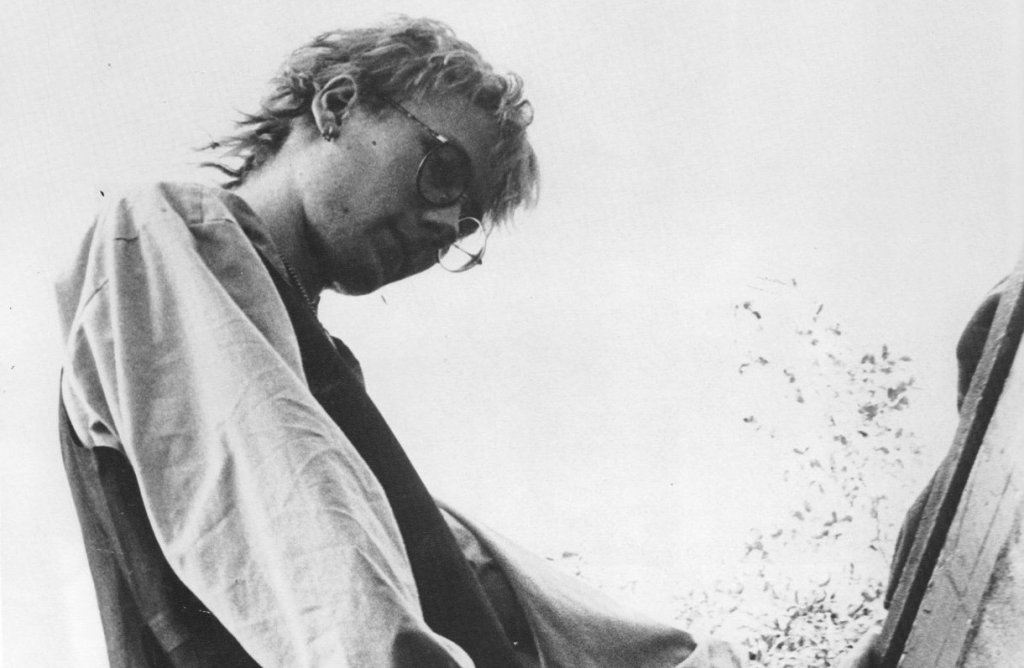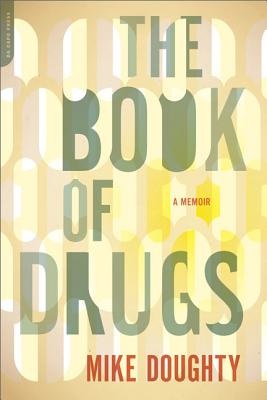Almost every morning, before brushing his teeth, he would chug a beer. Eating breakfast, he would smoke weed or shoot heroin.

He would run to the bathroom to vomit so often he eventually he got lazy and stopped kneeling toward the toilet. In the days when Mike Doughty’s substance abuse hit its peak, few exploits were off limits.
Today, the 41-year-old singer-songwriter — and Eugene Lang College ‘91 graduate — has been clean for nearly a dozen years. He jokes that his memoir, “The Book of Drugs,” is “JADN” — “just another drug narrative.” With self-deprecating stories of petty band feuds, post-coital handshakes with groupies, and enlisting Jeff Buckley’s help on moving day, he invites readers into his sardonic world.
Doughty rose to fame as the frontman for Soul Coughing, the “deep slacker jazz” band best known for alternative rock radio hits like “Super Bon Bon” and “Circles.” As the youngest member of the group, he faced ridicule from his bandmates and often felt overwhelmed and bullied. Drugs, he says, became his way to handle not only the tension with bandmates, but also the demand of creative life.
But in 2000, following the breakup of the band and a near-fatal Thanksgiving Day heroin overdose at his parents’ house, Doughty kicked his addiction. Soon after, he began a first solo tour, traveling 9,000 miles across America in a rental car.
Since then, he has played Madison Square Garden, recorded four studio albums, appeared on “The Late Show With David Letterman,” and even published a book of poetry.
Doughty’s newer songs, such as “Looking at the World from the Bottom of a Well,” released in 2005, and “(I Keep On) Rising Up,” released in 2009, feature a lighter tone than those from the Soul Coughing years. Still, he is surprised how quickly his longtime fans embraced what he calls his “sad man, happy man” shift in style.
“The Book of Drugs” (De Capo Press; 252 PP.; $16) is available in bookstores now.

Why are you releasing the book now?
Actually, I didn’t have any plans on writing it at all. But then a friend of mine called my bluff on it. So I eventually decided to put my stories together and make the book.
How would you describe the format of the book?
It’s pretty compact, like a Ramones song. But most of it is just basically stories of things that have happened to me along the way. Some of it was chronological, and I wrote other stuff on an as-I-remember-it basis. I didn’t write it in chapters, but my agent gave me a call after he gave it a look and told me, “I really like what you did with this!” So it stuck.
In addition to your musical talent, you are known for your lyrics. What did you pick up first? Writing or music?
In high school, I would write these science fiction stories. Even though they weren’t really my own. I stole a lot from Burgess.
How did your time at The New School impact you?
The professors there were some of the most talented people I have ever met. I took a writing course taught by Sekou Sundiata [a former Lang writing professor and Grammy-nominated poet who died of heart failure in 2007] and he would come up with these phrases like, “Is it soup? Is it soup?” In other words, he pushed us to nourish and get to the essence of what we were writing about. He was pivotal to helping me find what I as looking for at Lang.
You went to school with Ani DiFranco.
Yeah! She was incredible. Still is. We both lived in the Loeb dorms on 12th Street, and we would always hear her practice. She has always had such a level head and attitude about herself. She was in the process of recording her first album already. We all knew she would go far.
Would you ever think of revisiting your alma mater?
It has been such a long time. And I know a lot has changed, so I’ll probably just let it live in my head.
Another fellow musician you got to know well was Jeff Buckley. How would you describe your relationship with him?
I originally met him when I was still a doorman at The Knitting Factory, a concert hot spot on Houston Street at the time. After my band made it to a major label, we toured around the country with him. Even among so-called “indie” artists, there’s always that desire to be accepted by large groups of people. And so, when I heard that he died, the first thing I thought to myself was, “This guy will be such a legend now.” Apparently, he wrote something in his journal about how much he admired me. I still can’t believe it.
What is the relationship you have now with your former Soul Coughing bandmates?
We had a chance to give Beck and the Beastie Boys a real run for their money, but the others in Soul Coughing were such assholes. Instead, we became this odd footnote. I mean, these guys actually thought they wrote the songs. I would show them lyrics I wrote, and they would tell me to my face, “You didn’t write that.” They actually, genuinely thought they wrote the songs. Of course I felt like shit. These were the kind of people I was around. We just mutually avoid each other as often as we can.
Now, as a solo artist, what’s it like to go back to all the venues, now that you’re clean?
It’s great! And the best part is, a lot of the fans are just as fun. I had this one woman who came up to me while I was playing a gig. She hands me a Sharpie, lifts her shirt, and asks me to sign her tit. Drugs or no drugs, if you’re in a position in which a woman wants you to do something like that, you’re not going to refuse.
Much of your book is based on personal memories. Have you thought about looking back at old journal entries you wrote as a point of reference?
No. I mean, there was a time when I needed to write them. They gave way to many of my ideas and many of the lyrics I have written. But that would be really tough for me to do.
Do you still fear relapse?
Yeah, there will always be that fear inside of me. But that’s really what the meetings are about. This one time, this woman and I were waiting for one of them to start. We kept waiting and waiting, and when nobody else showed up, we just started talking like we would at any other meeting, hearing each other’s stories. It’s incredible to play that role in someone’s recovery.







Leave a Reply